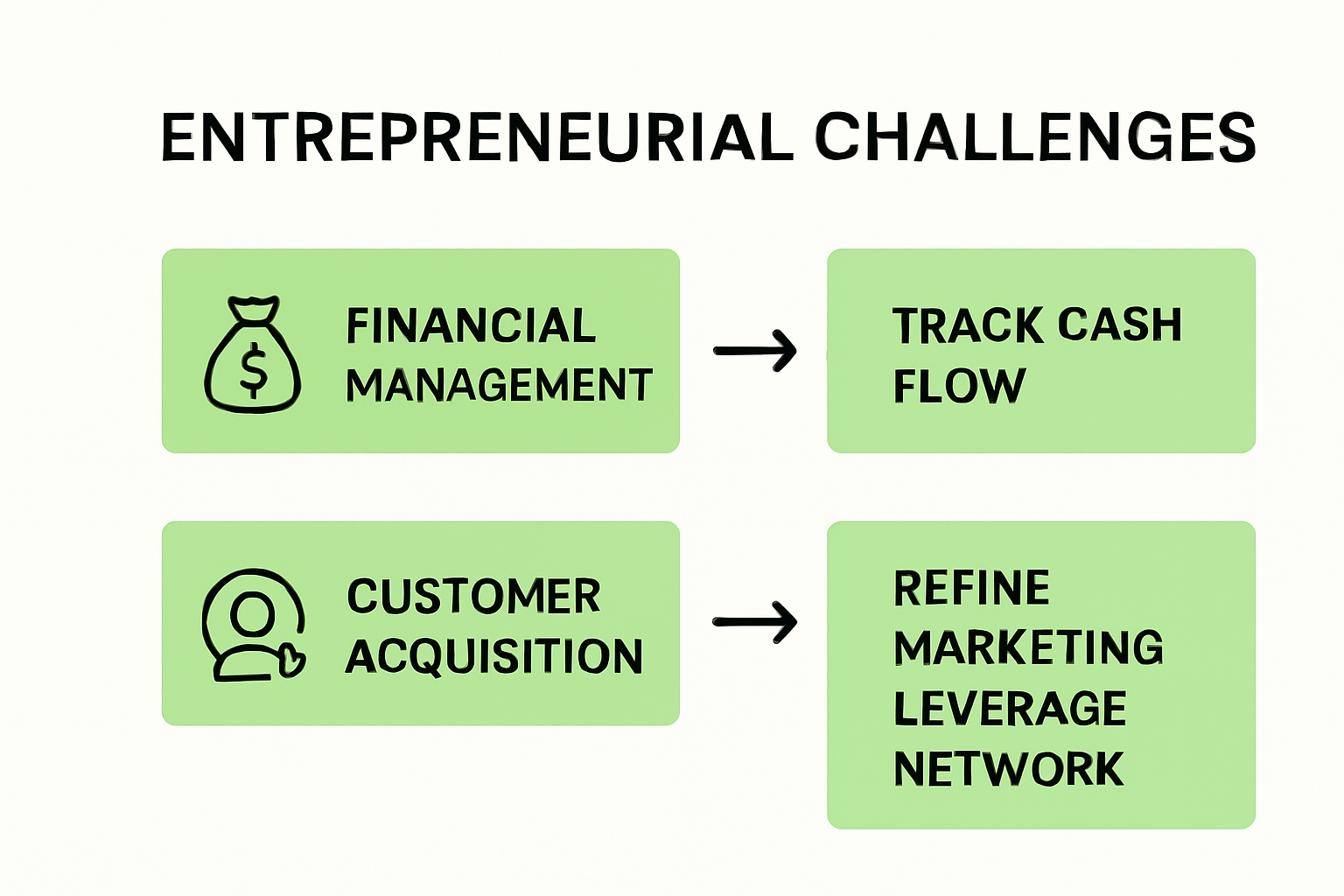
Building Resilience in Business: A 2025 Guide for New Entrepreneurs
Entrepreneurs in 2025 are facing a wild mix of uncertainty and opportunity, where every decision can make or break a business overnight. You might think that the secret to success is having cutting-edge ideas or deep pockets. The real surprise is that over 80 percent of sustainable startups credit resilience—not resources—as their most important asset, reshaping how new founders should prepare for the future.
Table of Contents
- Why Resilience Matters For New Entrepreneurs
- The Psychological Foundation Of Entrepreneurial Success
- Strategic Resilience In Business Development
- Core Skills For Building Business Resilience
- Adaptive Problem-Solving Techniques
- Emotional Intelligence And Mental Fortitude
- Common Challenges And How To Overcome Them
- Financial And Resource Management Challenges
- Market Positioning And Customer Acquisition
- Actionable Strategies For Lasting Success
- Building A Robust Business Infrastructure
- Cultivating A Flexible Mindset
Quick Summary
Why Resilience Matters for New Entrepreneurs
Entrepreneurship is not a straight path but a winding journey filled with unexpected challenges and opportunities. Building resilience isn’t just a buzzword - it’s the fundamental skill that separates successful founders from those who give up when obstacles emerge.
The Psychological Foundation of Entrepreneurial Success
Resilience goes beyond simple persistence. According to research published in Frontiers in Psychology, psychological traits like entrepreneurial self-efficacy directly impact an entrepreneur’s ability to learn from failure and continue pursuing new opportunities. This means resilience isn’t just about bouncing back - it’s about transforming setbacks into strategic learning experiences.
Entrepreneurs face unique psychological pressures. Market uncertainties, financial constraints, and constant decision-making create an environment where mental fortitude becomes your most valuable asset. The ability to maintain emotional equilibrium while navigating complex business challenges determines your long-term survival and potential for growth.
Strategic Resilience in Business Development
Research from the Small Business Institute Journal highlights that entrepreneurs who proactively develop resilience strategies are significantly more likely to achieve sustainable success. These strategies aren’t just reactive coping mechanisms but deliberate approaches to managing business uncertainty.
Key resilience strategies include:
- Support Systems: Building professional networks and mentorship connections that provide guidance and emotional support
- Growth Mindset: Viewing challenges as opportunities for learning and personal development
- Adaptive Planning: Creating flexible business models that can quickly pivot in response to market changes
The most successful entrepreneurs understand that resilience is a skill that can be cultivated. It’s not an innate talent but a muscle that grows stronger with intentional practice and self-reflection. Check out our comprehensive guide on developing entrepreneurial strategies to learn more about building this critical capability.
Ultimately, resilience in business is about maintaining forward momentum. When unexpected challenges arise - and they will - your ability to stay calm, analyze the situation objectively, and take strategic action will define your entrepreneurial journey. It’s not about never failing but about failing forward, extracting valuable insights from each experience that ultimately propel you toward your goals.
Core Skills for Building Business Resilience
Building business resilience requires a strategic and multifaceted approach that goes beyond simple survival tactics. Successful entrepreneurs understand that resilience is a dynamic skill set that can be intentionally developed and refined over time.
Adaptive Problem-Solving Techniques
According to the National Institute of Standards and Technology, effective business resilience hinges on developing seven core competencies, with situational awareness and rapid adaptation being paramount. These skills enable entrepreneurs to transform potential obstacles into strategic opportunities.
Adaptive problem-solving involves three critical components:
- Rapid Assessment: Quickly analyzing challenges without emotional reactivity
- Creative Solution Generation: Developing multiple potential approaches to complex problems
- Flexible Implementation: Being willing to pivot strategies based on real-world feedback
Entrepreneurs who master these techniques can navigate uncertainty with confidence, turning potential setbacks into moments of strategic innovation.
To clarify the three critical components of adaptive problem-solving mentioned above, here’s a table summarizing their focus and impact:
Emotional Intelligence and Mental Fortitude
Cornell Health emphasizes that cultivating a growth mindset is fundamental to building personal and professional resilience. This approach transforms challenges from insurmountable barriers into valuable learning experiences.
Key aspects of emotional intelligence for entrepreneurs include:
- Maintaining emotional equilibrium during high-stress situations
- Developing self-awareness to recognize personal stress triggers
- Building robust psychological mechanisms for managing uncertainty
Mental fortitude isn’t about eliminating stress but about developing healthy strategies to process and channel challenging emotions productively. Explore our comprehensive strategies for entrepreneurial mindset development to deepen your understanding.
Ultimately, business resilience is a holistic skill that combines strategic thinking, emotional intelligence, and continuous learning. By intentionally developing these core competencies, entrepreneurs can create robust frameworks that not only survive unexpected challenges but transform them into opportunities for growth and innovation. The most successful founders view resilience not as a defensive mechanism but as a proactive approach to navigating the complex landscape of entrepreneurship.
Common Challenges and How to Overcome Them
Every entrepreneurial journey is riddled with obstacles that test your resolve and strategic thinking. Understanding these challenges is the first step toward developing effective resilience strategies that transform potential roadblocks into opportunities for growth.
Financial and Resource Management Challenges
According to SCORE, new entrepreneurs consistently face significant challenges related to limited financial resources and inexperience in managing business finances. These challenges can quickly derail even the most promising ventures if not addressed strategically.
Key financial resilience strategies include:
- Cash Flow Management: Developing robust financial tracking systems
- Diversified Funding: Exploring multiple revenue streams and funding options
- Lean Operations: Minimizing unnecessary expenses while maintaining operational efficiency
Entrepreneurs must learn to treat their financial resources as a critical strategic asset, making informed decisions that balance immediate needs with long-term sustainability.
Market Positioning and Customer Acquisition
Research from Resilient Organizations highlights that finding the right market segment and building a reliable customer base are among the most significant challenges new entrepreneurs face. This requires a combination of market research, strategic positioning, and adaptive marketing approaches.
Effective strategies for overcoming market challenges include:
- Conducting thorough market research
- Developing a unique value proposition
- Creating flexible marketing strategies that can pivot quickly
Successful entrepreneurs understand that market positioning is not a one-time effort but an ongoing process of learning, adapting, and refining their approach. Learn more about developing robust entrepreneurial strategies to navigate these complex challenges.
Ultimately, overcoming entrepreneurial challenges requires a combination of strategic thinking, emotional resilience, and a willingness to learn from both successes and failures. Each obstacle presents an opportunity to refine your approach, develop new skills, and strengthen your business’s foundation. The most successful entrepreneurs view challenges not as insurmountable barriers but as valuable learning experiences that contribute to their long-term growth and success.

Here’s a comparison table outlining two common challenges for new entrepreneurs and suggested strategies to overcome them, as discussed in this section:
Actionable Strategies for Lasting Success
Successful entrepreneurship requires more than passion - it demands strategic planning, continuous learning, and the ability to implement actionable strategies that transform potential challenges into opportunities for growth.
Building a Robust Business Infrastructure
The U.S. Small Business Administration emphasizes the critical importance of developing a comprehensive business resilience strategy. This involves anticipating potential disruptions, creating comprehensive contingency plans, and implementing strategic redundancies that protect your business from unexpected market shifts.
Key infrastructure development strategies include:
- Risk Assessment: Regularly evaluating potential business vulnerabilities
- Operational Redundancy: Creating multiple pathways for critical business functions
- Technology Integration: Leveraging digital tools to enhance business flexibility
Entrepreneurs who invest time in building a robust infrastructure create a foundation that can withstand unexpected challenges and quickly adapt to changing market conditions.

Cultivating a Flexible Mindset
SCORE’s Resilience Guide highlights the importance of developing an adaptability mindset. This approach goes beyond mere survival - it’s about creating a business model that can thrive in uncertain environments.
Strategies for developing entrepreneurial flexibility include:
- Continuous market research and trend analysis
- Regular skills development and learning
- Maintaining an open and innovative approach to problem-solving
Flexibility isn’t about changing your core vision but about being willing to adjust your approach to achieve your ultimate business goals. Explore our comprehensive guide to entrepreneurial adaptability to deepen your understanding of this critical skill.
Ultimately, lasting success in entrepreneurship comes from a combination of strategic planning, continuous learning, and the ability to transform challenges into opportunities. The most successful entrepreneurs view their business as a living, evolving entity - one that requires constant attention, adaptation, and strategic thinking. By implementing these actionable strategies, you create a resilient business framework that can navigate uncertainty, capitalize on emerging opportunities, and build sustainable long-term success.
Frequently Asked Questions
What is resilience in the context of entrepreneurship?
Resilience in entrepreneurship refers to the ability of founders to navigate challenges and setbacks while maintaining focus on their goals. It’s about learning from failures and transforming obstacles into opportunities for growth.
Why is a growth mindset important for new entrepreneurs?
A growth mindset allows entrepreneurs to view challenges as learning experiences, which enhances their problem-solving abilities and innovation skills. This perspective is crucial for overcoming obstacles and adapting their business strategies effectively.
How can new entrepreneurs develop emotional intelligence?
New entrepreneurs can develop emotional intelligence by practicing self-awareness, managing their emotions during stressful situations, and seeking feedback from mentors. This can help them navigate the psychological pressures of entrepreneurship more effectively.
What are some effective strategies for overcoming financial challenges?
Effective strategies include maintaining robust cash flow management, exploring diversified funding options, and implementing lean operational practices to minimize unnecessary expenses while maximizing efficiency.
Transform Your Business Resilience Into Real Results with siift
Struggling with uncertainty and constant challenges on your founder journey? In this article, you discovered that the real engine of entrepreneurial success in 2025 is resilience, not just talent or investment. The pain of unpredictable markets, tight resources, and emotional pressure can feel overwhelming, making it difficult to move forward with confidence. Concepts like growth mindset, adaptive problem-solving, and building a support network are more than buzzwords – they are critical skills for any new entrepreneur aiming to thrive instead of just survive.
You do not have to navigate these hurdles alone. siift offers a dedicated AI compass for founders, providing step-by-step guidance and truly personalized feedback. Let siift help you turn every setback into a learning opportunity, prioritize the right actions, and de-risk your journey without any biases or unnecessary pressure. Start building real resilience in your business today. Sign up at siift’s main platform and let your path to sustainable growth begin now. If you are ready for more practical strategies, explore our expert-backed guide to entrepreneurial resilience and see how siift can totally transform the way you build your business.
Recommended
- blog | siift | Business Resilience Strategies for Beginners 2025 Guide
- blog | siift | Top Reasons Businesses Fail in 2025: A Guide for New Founders
- blog | siift | Business Plan Essentials 2025: A Beginner’s Guide for New Founders
- blog | siift | Building Entrepreneurial Mindset: Steps for Beginners in 2025
- A/B Testing for Small Businesses: Boost Results in 2025
- Resilienz aufbauen 2025: Strategien für mehr Energie und Fokus

see where you really stand





.svg)
.svg.png)



.svg)

